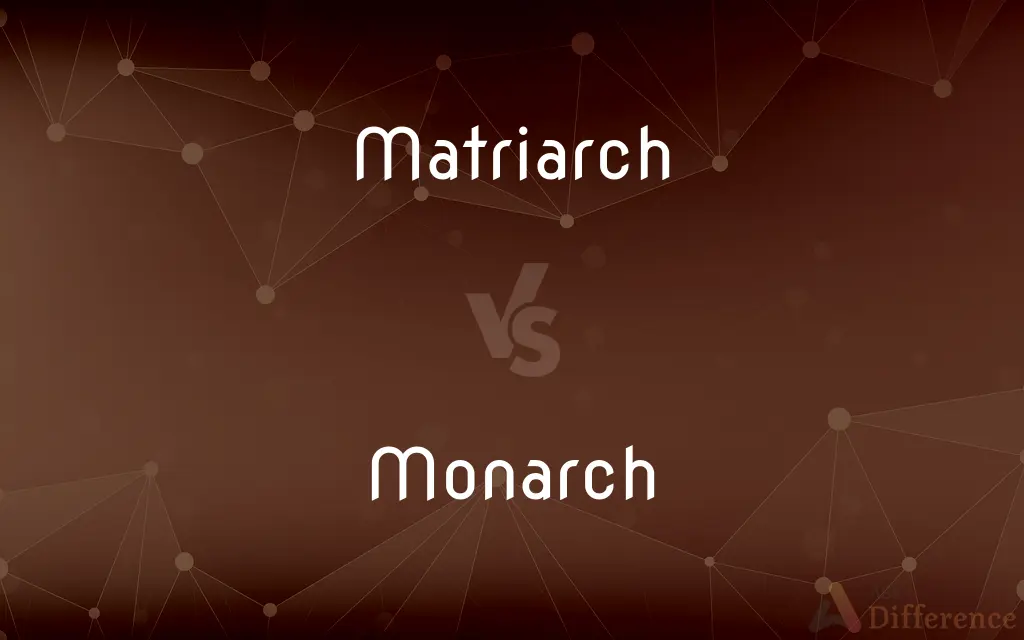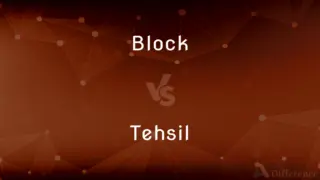Matriarch vs. Monarch — What's the Difference?
By Urooj Arif & Fiza Rafique — Updated on April 16, 2024
Matriarch denotes a female leader of a family or group, emphasizing maternal authority; monarch refers to a sovereign head of state, regardless of gender.

Difference Between Matriarch and Monarch
Table of Contents
ADVERTISEMENT
Key Differences
A matriarch typically refers to a woman who holds authority within a familial or tribal structure, often seen as a senior figure whose experience and wisdom guide family decisions. Whereas a monarch is a formal title for a king or queen, who rules a kingdom or empire, often inheriting their position.
The term matriarch is deeply rooted in familial and social contexts, highlighting leadership based on age and relationship within a group. On the other hand, a monarch’s role is political, embodying state governance and national representation, irrespective of familial ties.
Matriarchs are often associated with motherly qualities and nurturing leadership, guiding through personal connections and emotional wisdom. Conversely, monarchs are figures of state authority and ceremonial duties, wielding political power and legal sovereignty.
In some cultures, the matriarch's authority is unofficial yet profoundly influential, relying on respect and traditional values. In contrast, monarchs hold official titles and constitutional roles, with clearly defined powers and responsibilities outlined in state laws.
While matriarchs may influence decisions through advice and moral authority, monarchs can enact laws, command armies, and govern nations, showcasing the broader scope and formal power of monarchy.
ADVERTISEMENT
Comparison Chart
Definition
A female leader of a family or group.
A sovereign head of state, typically a king or queen.
Basis of Authority
Familial ties and respect within the group.
Legal and constitutional rights to rule.
Role Scope
Focus on family or group guidance.
Governs a state or territory with formal authority.
Common Qualities
Nurturing, wisdom, emotional intelligence.
Leadership, diplomacy, statecraft.
Cultural Context
Often informal and based on tradition.
Formal, with established historical and legal foundations.
Compare with Definitions
Matriarch
A figure of maternal authority.
The matriarch's advice was always sought at family meetings.
Monarch
A ceremonial figurehead in some modern countries.
The monarch played a key role in national festivals.
Matriarch
A senior woman who leads her family or community.
The Smith family's decisions often depended on their matriarch's approval.
Monarch
A reigning king or queen of a country.
The monarch ceremonially opened the new parliament session.
Matriarch
An influential older woman within a community.
She was respected as a matriarch in the neighborhood.
Monarch
A ruler with supreme authority.
The monarch decreed new laws that would benefit his subjects.
Matriarch
The female head of a family.
As the matriarch, she organized all major family gatherings.
Monarch
The ultimate symbol of the state's continuity and tradition.
The monarch represented centuries of history at the coronation.
Matriarch
A woman who commands authority in any group.
In their company, she was the matriarch who mentored many young professionals.
Monarch
The hereditary sovereign of a state.
As a monarch, he inherited the throne from his mother.
Matriarch
A woman who rules a family, clan, or tribe.
Monarch
A monarch is a head of state for life or until abdication, and therefore the head of state of a monarchy. A monarch may exercise the highest authority and power in the state, or others may wield that power on behalf of the monarch.
Matriarch
A woman who dominates a group or an activity.
Monarch
A sole and absolute ruler.
Matriarch
A highly respected woman who is a mother.
Monarch
A sovereign, such as a king or empress, often with constitutionally limited authority
A constitutional monarch.
Matriarch
A female leader of a family, a tribe or an ethnic or religious group.
Monarch
One that commands or rules
"I am monarch of all I survey" (William Cowper).
Matriarch
The dominant female in a family group of elephants
Monarch
One that surpasses others in power or preeminence
"Mont Blanc is the monarch of the mountains" (Byron).
Matriarch
A female founder of a political or religious movement, an organization or an enterprise.
Monarch
A monarch butterfly.
Matriarch
The mother and ruler of a family or of her descendants; a ruler by maternal right.
Monarch
The ruler of an absolute monarchy or the head of state of a constitutional monarchy.
Matriarch
A woman who dominates or is the most important member of a group or organization; in businesses, often the founder or owner of the largest interest.
Monarch
The monarch butterfly, Danaus plexippus, and others of genus Danaus, found primarily in North America, so called because of the designs on its wings.
Matriarch
A venerated old woman.
Monarch
(Aboriginal English) A police officer.
Matriarch
A female head of a family or tribe
Monarch
(often capitalised) A stag which has sixteen or more points or tines on its antlers.
Matriarch
A feisty older woman with a big bosom (as drawn in cartoons)
Monarch
The chief or best thing of its kind.
Monarch
Any bird of the family Monarchidae.
Monarch
A sole or supreme ruler; a sovereign; the highest ruler; an emperor, king, queen, prince, or chief.
He who reignsMonarch in heaven, . . . upheld by old repute.
Monarch
One superior to all others of the same kind; as, an oak is called the monarch of the forest.
Monarch
A patron deity or presiding genius.
Come, thou, monarch of the vine,Plumpy Bacchus.
Monarch
A very large red and black butterfly (Danais Plexippus); - called also milkweed butterfly and monarch butterfly.
Monarch
Superior to others; preëminent; supreme; ruling.
Monarch
A nation's ruler or head of state usually by hereditary right
Monarch
Large migratory American butterfly having deep orange wings with black and white markings; the larvae feed on milkweed
Common Curiosities
What are the key differences between a matriarch and a monarch?
A matriarch leads based on familial or community respect, often associated with wisdom and nurturing qualities. A monarch, however, is a formal sovereign ruler with political and ceremonial duties defined by constitutional or traditional laws.
How do matriarchs influence decision-making in families?
Matriarchs typically influence family decision-making through persuasion, moral authority, and by leveraging their experience and wisdom, often guiding younger family members.
Is the term matriarch specific to any particular culture?
While not specific to any single culture, the concept of a matriarch is more prominent in matrilineal societies where female elders are particularly revered and play a central role in leadership.
Can a monarch also function as a matriarch in their personal family life?
Yes, female monarchs can function as matriarchs within their families, exerting influence and authority similar to that of a family's senior female leader.
What symbols are associated with monarchs?
Monarchs are often associated with symbols of authority like crowns, scepters, thrones, and royal regalia that signify their sovereign status.
Do all monarchs inherit their positions?
While many monarchs inherit their positions through hereditary succession, there are instances in history where monarchs have been elected, such as in some medieval and early modern European kingdoms.
What is the historical origin of monarchies?
Monarchies have diverse origins, often emerging from tribal leaders or chiefs who consolidated power and passed authority down through hereditary lines, becoming more structured over time.
Are there any famous historical figures who were matriarchs?
Yes, many cultures have notable historical matriarchs, such as Eleanor of Aquitaine, who was both a political leader in France and England and a family matriarch.
How does the authority of a matriarch compare to that of a tribal chief?
A matriarch's authority is often more focused on familial and internal group matters, while a tribal chief generally has broader authority that includes political, economic, and military aspects.
What is the significance of a matriarch in a matrilineal society?
In matrilineal societies, a matriarch holds significant power and influence, as lineage and inheritance are traced through the female line, making her role crucial in the continuity of family legacy.
Can a monarch be elected in modern times?
Yes, while rare, there are modern examples of elective monarchies, such as the Papacy or the Malaysian king, who is selected by a council of hereditary rulers.
How is a matriarch's leadership style typically characterized?
A matriarch’s leadership style is often characterized by empathy, consultative decision-making, and a focus on maintaining harmony and tradition within the group.
How do monarchies change in a democratic context?
In democratic contexts, monarchies often evolve into constitutional forms where the monarch's powers are limited and largely symbolic, with the real governing authority resting in the hands of elected officials.
What is the role of a monarch in a constitutional monarchy?
In a constitutional monarchy, the monarch's role is largely ceremonial, with actual governing power held by elected officials, and the monarch acting as a symbolic figurehead.
What responsibilities do matriarchs have in modern family structures?
In modern family structures, matriarchs often take on responsibilities like overseeing family traditions, resolving disputes, and ensuring the welfare of all family members.
Share Your Discovery

Previous Comparison
Sour vs. Tangy
Next Comparison
Block vs. TehsilAuthor Spotlight
Written by
Urooj ArifUrooj is a skilled content writer at Ask Difference, known for her exceptional ability to simplify complex topics into engaging and informative content. With a passion for research and a flair for clear, concise writing, she consistently delivers articles that resonate with our diverse audience.
Co-written by
Fiza RafiqueFiza Rafique is a skilled content writer at AskDifference.com, where she meticulously refines and enhances written pieces. Drawing from her vast editorial expertise, Fiza ensures clarity, accuracy, and precision in every article. Passionate about language, she continually seeks to elevate the quality of content for readers worldwide.














































